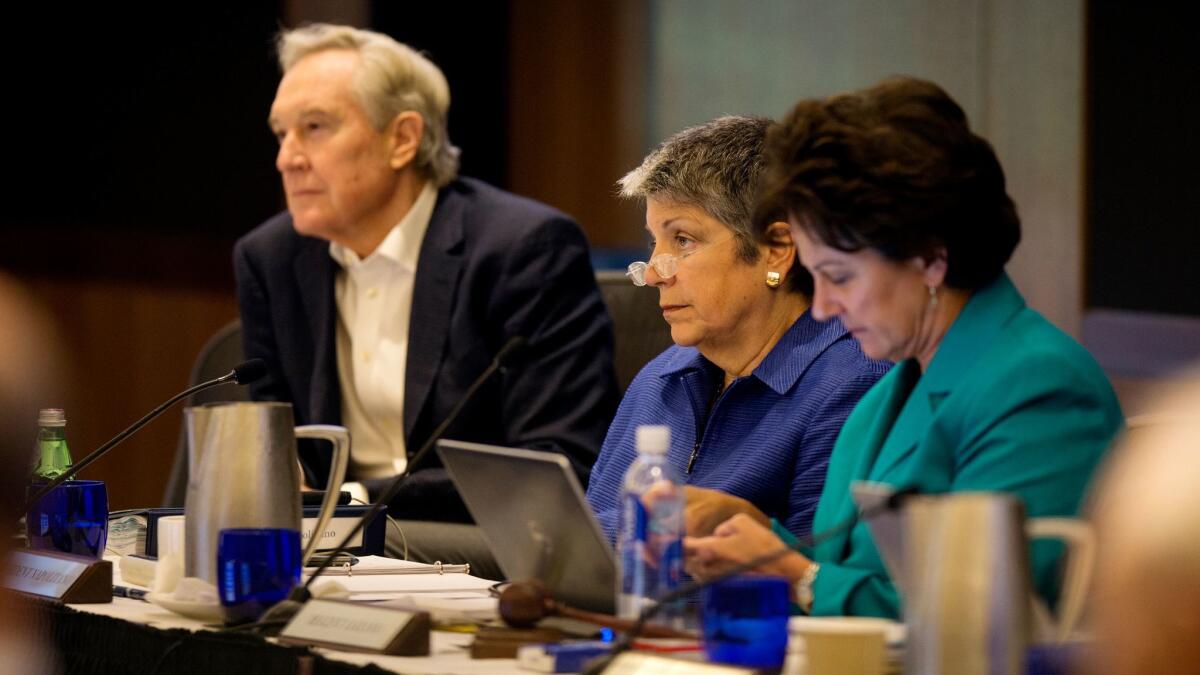At UC regents meeting, unease and uncertainty over Donald Trump’s presidency

- Share via
Reporting from San Francisco — Members of the University of California community expressed unease and concern Wednesday about Donald Trump’s presidency and its potential effects on Muslims, people who are in the country without legal permission and other vulnerable campus groups.
UC President Janet Napolitano told regents in their opening session that “understandable uncertainty and consternation” about Trump had prompted her and the chancellors to reaffirm their commitment to inclusion and equal opportunity in a public statement shortly after the election.
“It is more important than ever that we preserve our core values, expand opportunity, and create and share knowledge in the public interest,” Napolitano said.
She also said she had formed a task force to help UC students who are in the country without legal permission and may be at greater risk of deportation under a Trump administration.
Napolitano, while serving as Homeland Security secretary in the Obama administration, created the 2012 policy to defer deportation proceedings against certain eligible students and allow them to apply for work permits. Trump has vowed to rescind that policy, known as Deferred Action for Childhood Arrivals.
The task force will look at ways to support UC’s estimated 3,700 students without legal residence from potential fallout of any Trump decisions on immigration, said UC spokeswoman Dianne Klein. That support could include legal aid, mental health services or help finding alternative income if students are no longer able to obtain work permits, she said.
“We are assuring our students that we will do everything in our power to protect them,” Klein said.
Alaa Aissi, a UC Berkeley student senator, told regents about an increase — since the election — in racial and religious slurs against Muslims like herself who wear head coverings on campus. At San Jose State University, she said, an attacker grabbed the hijab of a 19-year-old student, causing her to choke and lose her balance.
“What was once tucked away in the home and dinner tables has been unleashed into public attacks and has been legitimized repeatedly by our next president,” she said.
James Chalfant, UC Academic Senate chair, said that faculty members were committed to protecting the safety and welfare of their students.
“To LGBTQ students, to students of color, to undocumented students, to every international student, and to any students concerned about whether they can count on faculty support: You are our students and you are our future,” he said.
Trump’s election also has UC officials anxious about the system’s finances. The university receives more than $8.5 billion in federal dollars for education, research and healthcare — a significant chunk of the system’s $25-billion budget. Federal funds are UC’s single largest source of research dollars, amounting to more than $3 billion.
UC had planned to press a new administration for more research money and for year-round federal Pell grants, which were revoked for summer sessions a few years ago. Gary Falle, associate vice president of federal government relations, told regents that the election of Trump and a Republican-controlled Congress made the outlook for success unpredictable.
“The only thing we know is uncertainty at this time,” Falle said.
Albert Lemus, a non-voting regent-designate, asked Falle how many federal dollars could be at risk if UC chose to become a “sanctuary campus” protecting those in the country without legal sanction.
“I suspect all of it could be at risk,” Falle said.
Regents did not discuss a tuition increase but are scheduled to take a deep dive Thursday into financial issues, including the budget, financial aid and tuition levels.
In other business, a regents committee approved stricter rules against board members who violate UC policies on ethical conduct and sexual harassment, even if their actions occur in private settings. The proposal by board Chairwoman Monica Lozano was prompted by disclosures that Regent Norman J. Pattiz made comments about the breasts and looks of women who worked at his PodcastOne business in Beverly Hills.
“The University of California has taken a strong, unequivocal stance on sexual violence and sexual harassment,” Lozano said. “We do not tolerate such conduct anywhere in our campus community.”
The full board will vote Thursday on the proposal, which would require all regents to take sexual-harassment-prevention training and subject them to possible sanctions if they acted unethically or displayed sexual misconduct. The sanctions could include a written censure or removal from committee leadership positions, but only the state attorney general has the power to remove a regent for serious misconduct such as corruption or felony crimes, according to Charles R. Robinson, the regents’ general counsel.
The committee also agreed to take a deeper look later at what other private behavior would be subject to the new rules after Regent John A. Pérez raised questions about whether the new rules would cover broader territory, including business dealings and hate speech. Pattiz voted for the proposal but did not speak, other than to say he had started sexual-harassment-prevention training.
The issue came up during public comments earlier in the day, when Julia Schemmer, a UC Riverside student and victim of sexual harassment, called for Pattiz’s resignation.
“The UC is a national trailblazer for sexual violence prevention. It should not have a board member who is the antithesis of these values,” she said, drawing cheers and claps.
In other public comments, several speakers urged regents to reject tuition increases, divest from fossil fuels and improve conditions for UC union workers.
Twitter: @TeresaWatanabe
More to Read
Sign up for Essential California
The most important California stories and recommendations in your inbox every morning.
You may occasionally receive promotional content from the Los Angeles Times.











